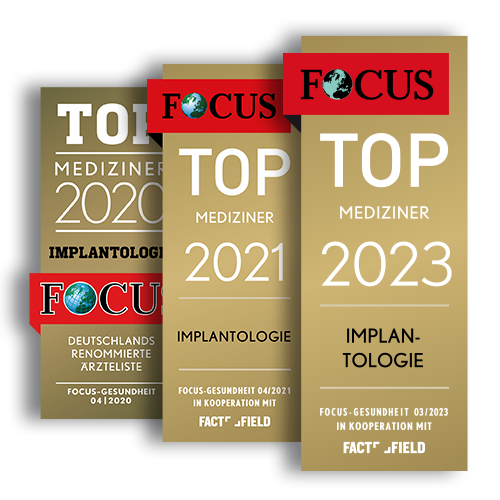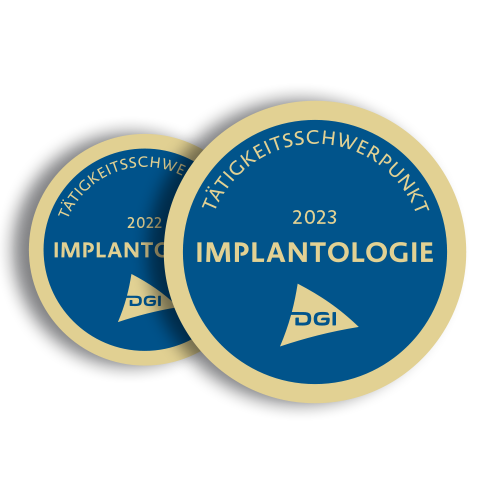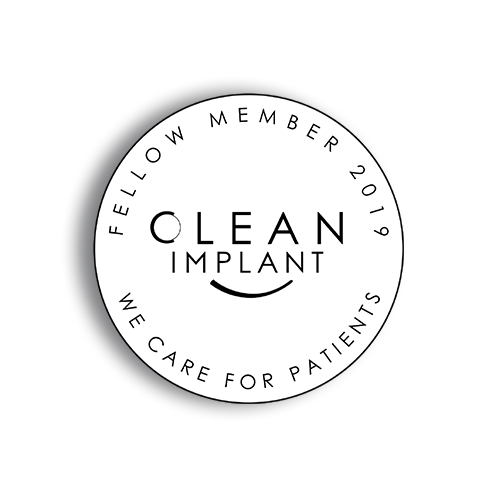Periodontitis – early diagnosis and targeted treatment
Please contact us if you answered “YES” to any of the above questions. We will conduct a thorough examination and consultation to determine what type and degree of periodontal apparatus disease you have. This generally requires an x-ray and measurement of the pocket depths around every tooth/implant. We then explain potential therapies to you and discuss a treatment plan specifically designed for you. The earlier that gum disease is detected, the fewer the treatment interventions that are required.
Types and frequency of the disease
Almost 60% of all people evidence simple, chronic, deep inflammation of the gums around teeth (periodontitis) and implants (peri-implantitis), and 20% evidence an aggressive, deep gum infection. These diseases can be detected as early as the age of 6. The earlier they are recognized, the fewer the interventions that will be required for treatment. Untreated, gum disease may lead to tooth or implant loss and destruction of the jaw bone. Through our team of specialists, a complete, long-term healing process is now possible in many cases.
Disease stages
From gingivitis to periodontitis
Gums can stay healthy through perfect oral hygiene once a day (focus on flossing / ultrasonic toothbrush). Superficial gingivitis can develop after only 3 – 5 days without efficient dental care. Without gingivitis, there is no periodontitis. There are additional risk factors that can weaken the body’s natural defense mechanisms and thus increase the risk for the development of periodontitis. These include smoking, stress, depression, and untreated blood sugar disease (diabetes mellitus) as well as hereditary disorders of the immune system. Only periodontitis leads to deep tissue destruction and jaw bone loss. Many times, these diseases develop with little or no pain. Untreated, they may lead to the loss of a natural tooth or dental implant. Aggressive periodontitis (infectious disease form) is often acquired through specific bacteria transmitted by a kiss (partner or family). In this case, it would make sense to notify these individuals of a potential gum disease in order to avoid reinfection at a later date. Surprisingly, this quickly progressing disease can be detected as early as age 6. A detailed diagnosis by a specialty team can thus have a profound effect already at a young age.
Gingivitis? Fast healing with an expert team!
Have gingivitis come and go within a week. Correctly-executed oral hygiene at home, based on customized instruction and teeth cleaning by specialty-trained personnel, brings fast results and complete healing.
Aggressive periodontitis and common diseases
Aggressive oral bacteria can block vascular tissue in the body and thereby trigger or cause myocardial infarction (heart attack), stroke (apoplexy), pneumonia, and asthma (bronchial). The World Health Organization (WHO) has identified these four diseases as major causes of death worldwide. A healthy oral cavity can significantly contribute to a person’s longevity.
Other common diseases may also be related to aggressive periodontitis:
- High blood pressure (hypertension)
- Vascular occlusion (thrombosis / embolism)
- Blood sugar disease (Diabetes mellitus)
- Premature birth
- Low birth weight
- Alzheimer’s (dementia)
- Joint inflammation (rheumatoid arthritis)
- Malignant growths of the mouth, jaw, and face (tumors)
- Obesity (adiposity)
- Urinary tract infection (urethritis)
- Kidney infections (pyelonephritis)
- Inflammation of the testicles (orchitis)
- Rejection responses to breast implants
- Scaly skin (psoriasis)
Periodontitis? – We make a targeted diagnosis and aim for a complete recovery!
If a severe form of the disease is suspected, we recommend analysis of existing bacteria located in the deep pockets. A bacterial test co-developed by us allows us to identify these aggressive pathogens with a great deal of precision and thereby differentiate between chronic and aggressive periodontitis. Even in the event of aggressive periodontitis, we can achieve complete healing in many cases. Generally, a case of chronic periodontitis at a mid-level severity is associated with limited treatment interventions. Medical therapy is always conducted by our physicians. Follow-up treatment is handled by our dental hygienists.
Customized risk assesment and corresponding long-term maintainance therapy with our prophylaxis team!
Following successful gum disease treatment, every patient receives a customized risk assessment. This ensures that re-occurrence of the disease, especially in the previous problem areas, can be avoided during long-term follow-up care. As a general rule, patients who evidence oral health or prior gingivitis patients should undergo dental prophylaxis treatment every 6 months. For patients with previous chronic periodontitis, prophylaxis treatment is recommended every 4 months, and for patients with previous aggressive periodontitis it is recommended every 3 months. This ensures long-term oral health. You will make significant contributions to your oral and overall health through regular prophylactic treatment at our practice. This is also the only way to protect your teeth and implants long term!
Implants in a healthy mouth
The best prognosis for implant longevity is achieved through efficient, daily oral hygiene on the part of the patient and continual care by a specialty-trained team of prophylaxis experts. Successful resolution of prior gum disease is also of great importance. For this reason, a respective examination, and, if applicable, successful treatment of gum disease must be completed prior to implantation.









